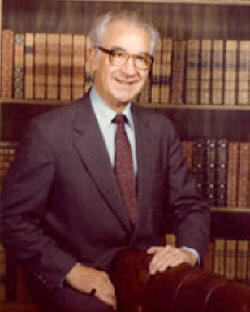

Queer Places:
Westwood United Methodist Church, 10497 Wilshire Blvd, Los Angeles, CA 90024
 Bishop Melvin E. Wheatley
(May 7, 1915 - March 1, 2009) risked censure in the United Methodist Church
for appointing his denomination’s first openly gay pastor in 1982.
Bishop Melvin E. Wheatley
(May 7, 1915 - March 1, 2009) risked censure in the United Methodist Church
for appointing his denomination’s first openly gay pastor in 1982.
Wheatley was known for promoting dialogue across faiths and cultures during nearly two decades in Los Angeles as senior pastor of the Westwood United Methodist Church. In 1972 he was elected bishop and assigned to Denver as the gay rights movement was underway.
In 1980 he broke with fellow bishops when he refused to support their joint statement calling homosexuality “incompatible with Christian teaching.” Two years later, he appointed an openly gay pastor, the Rev. Julian Rush, to a Denver church and was accused of heresy but was absolved by a national church panel.
Although its official position on homosexuality remains as it was in 1980, the church has become more accepting, with a growing number of bishops welcoming gays in the pastorate.
Wheatley “was a visionary for the whole church,” said the Rev. Donald Messer, president emeritus of the Iliff School of Theology in Denver, who knew Wheatley for 30 years. “He was the Martin Luther of the Methodist Church. He freed all of us to be less prejudiced, biased and dogmatic.”
The son and grandson of Methodist ministers, Wheatley was born May 7, 1915, in Lewisville, Pa.
He earned a bachelor’s degree from American University in Washington, D.C., in 1936 and a divinity degree from Drew Theological School in New Jersey in 1939. He served at Methodist churches in Fresno, Modesto and Stockton before being assigned to Westwood, where he served from 1954 to 1972.
As an associate pastor in Fresno during World War II, he caused a stir when he moved into the home of a Japanese American family to protect it from vandals after the family was ordered into an internment camp. Two decades later in Westwood, he broke down racial barriers by exchanging pulpits with the Rev. L.L. White of Holman Methodist Church in Central Los Angeles. The exchange took place in 1964, a year before the Watts riots.
In 1972, the year he became bishop, the United Methodist Church took its first official stand against homosexuality. Six years later, in 1978, Wheatley stunned his fellow bishops when he announced that he could not support any church teaching that discriminated against members because of their sexual orientation.
In an emotional speech, he declared that he and his wife, Lucile, knew and cherished several gay people whose lives were “as close to authentic Christian living as we perceive ourselves to be.” Those individuals, he added, included one of his own sons, John, who came out to his family in 1973. At the church’s 1980 General Conference, he was the only bishop who refused to sign the statement that condemned “the practice of homosexuality” and called it “incompatible” with Christian teaching.
In 1982, Rush, a youth minister in Boulder, Colo., told Wheatley and other church officials that he was separating from his wife because he was gay. A parish committee asked that Rush be removed from his post.
Rush later told the New Yorker magazine that he expected to “fold my tent and quietly steal away,” but Wheatley wanted him to remain at the church until a compromise could be reached. After months of controversy, Wheatley reassigned him to a Denver parish that had a large number of gay congregants.
The controversy did not end there, however. A Methodist minister in Georgia upset by Wheatley’s defense of Rush led a campaign against the bishop, accusing him of spreading doctrines that violated church standards on homosexuality.
Despite sharp questioning at a hearing held by a national church panel, Wheatley did not back down from his belief that homosexuality was not a sin. On the contrary, he told the seven-member panel hearing his case, “Homosexuality is a mysterious gift of God’s grace.”
The panel, deciding that there was “no reasonable ground” for prosecution, cleared him of all charges.
“So many gay men and women who have been ministers in the church were in essence thrown under the bus. He kept that from happening to me,” Rush, who remained a minister in good standing, told The Times last week. “He really pushed the bishops in the church to start reevaluating. There has been a huge upheaval since then, which has been very healthy.”
Wheatley retired in 1984 to Laguna Woods in Orange County. That year, his son John died of melanoma. He is survived by his wife of 69 years, Lucile; sons Paul and James; and three grandchildren.
He died March 1 in Mission Viejo after a lengthy illness, a church spokesman said. He was 93.
My published books:
